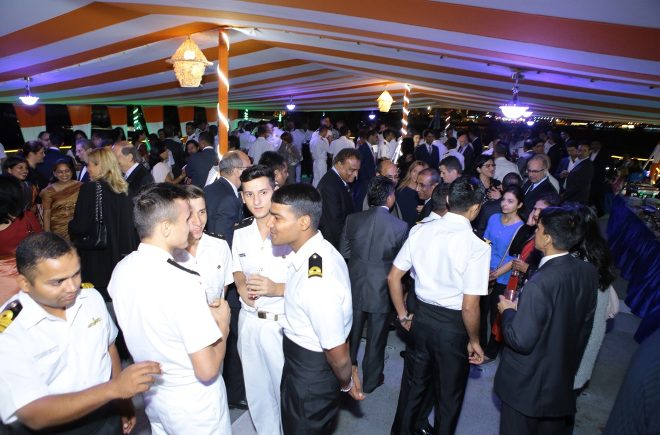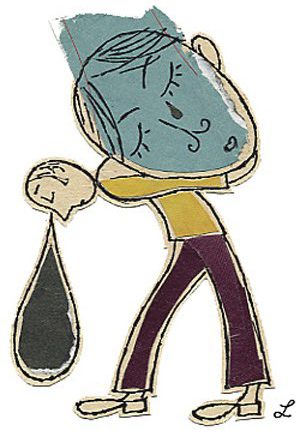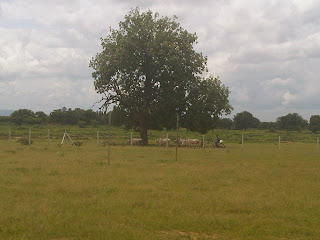As soon as I was commissioned in the Navy I had to undergo Subaltern Lieutenant’s training courses. The user-maintainer concept had just been introduced and we had to go to Navy’s Electrical Engineering training establishment named Valsura in Jamnagar, Gujarat, to acquire skills to become proficient first level maintainers.
Most of the First Class compartments had been booked for our course as we headed towards Jamnagar. To pass time, we played Bridge and drank beer and rum. When the TTE (I still remember his name on the his name telly: V Srivastava) came to our compartment he saw that we were drinking. He was visibly shocked at this and addressed us in chaste Hindi which is translated thus: “Young men, you should be ashamed of yourself. You are passing through Mahatma Gandhi’s state wherein drinking liquor is prohibited. And yet, here you are – young men who would be responsible to defend our nation – shamelessly breaking the law and drinking.”
I was, at that time (perhaps I still am) an idealist and moralist. I was so mortified by this that I left the gang, collected my Ayn Rand and climbed to the upper berth to hide my head in shame. I was so immersed in ‘The Fountainhead’ that after some time when I looked down I found the TTE having a drink with my friends. I got down from the berth and berated him, “Srivastava ji, you had no right to be pseudo moralistic. Look at you, now, a TTE on duty having liquor. I think at the next station we shall hand you over to the Vigilance people”.
His reply is pointer towards the central theme of this essay, “Ab chhodiye bhai sahib. Main to ek do peg pi ke chala jayoonga; vigilance wale kam se kam poori botal lenge aapse”. (Just forget it, brother. I shall (quietly) go after one or two pegs; the vigilance people would demand a full bottle, at the least).
On another occasion, I was travelling by the defence – services – friendly Frontier Mail, from Bombay to Delhi. Just the hint of one being a defence officer [and entitled to draw “pure” (it was the public perception) rum] would get one a vacant berth that would have otherwise got the TTE some chai-paani money from others. After “adjusting” the passengers the TTE came to me in the coupe’ he had told me to occupy. I offered him a drink, which soon became two, three, four etc. That loosened his tongue. Over a period of next one hour he told me that he had a house in South Delhi, another in Jaipur, two cars etc and that his elder daughter was about to marry an IAS officer from “a rich family”.
I not only showed surprise but expressed it, “I say, you guys really indulge in corruption and can get anything”.
His reply was as classic as that of TTE Srivastava. He said, “Bhai Sahib, hum to apni mehnat ki kamai khaate hain. Corrupt to hamare bade sahib hain jo ghar baithe hi paise bana rahe hain” (Brother, we (TTEs) only enjoy the fruits of our labour. Corrupt are the big bosses in railways who get the money sitting at home”.
These two are mere examples of our (voyeuristic?) attitude when we see yet another example of corruption in public life. The “bigger fish” always seems to get away whilst poor people like us who do indulge in petty corruption (either in giving bribes or receiving chai-paani money) are always made scapegoats.
What do you think shocked us about corruption in recently concluded CWG deals? Well, not the fact of the corruption but the sheer scale of it.
Laxman’s cartoon, many years back, about big time corruption was most telling. In this a policeman is seen taking a handcuffed petty thief to the Police Station and telling him, “Your fault is that you stole five bucks. If you had stolen fifty crores I could have been your security guard”.
Corruption at higher levels does affect the morale of the people at lower levels. And when we hear about increasingly more stupendous and brazen corrupt cases, we see one holy bastion or the other crumbling. Over a period of time our perception is that politicians, bureaucrats, engineers, doctors, film stars (casting couch, avoidance of income tax et al), religious leaders, railway TTEs, personnel in government departments from peon to boss, shopkeepers and tradesmen, cricketers and policemen are not only corrupt but have earned the right to be so. We publicly hate them for it. But, if we have to marry our daughters, we find these as the most eligible bachelors. In my last posting in the Navy before I retired, a sailor from Haryana wanted his daughter to be married to an ASI in the police. He was asked to pay rupees ten lakhs in dowry “considering the earning capacity of the ASI and hence the ability to keep your daughter happy”.
We resignedly accept corruption even in the judiciary. But when the last bastion of upright behaviour, that is, armed forces too display signs of corruption a la booze-colonels, fake-encounter-for-medal COs, Tehelka expose’ big-wigs, land and housing scam generals and admirals, we tend to bemoan that there is “total lack of moral values in Indian public life”. How can these jokers be trusted in war when they indulge in such immoral acts? Isn’t esprit de corps the hallmark of defence forces? How would their men have trust in them when they indulge in such things? How could they stoop so low? How could they shamefacedly make such statements that they did not know that the land belonged to the military or to the war-widows?
Seven years back I was asked to conduct a major investigation into endemic corruption at Navy’s Material Organisation at Mumbai. This was a prelude to trying by Courts Martial all those found involved. Gradually it came out that everyone from the top (Material Superintendent) to bottom was involved and that the case, just like the Adarsh Society case, should be handed over to the CBI (Central Bureau of Investigation). Indeed, a Navy Order exists to the effect that with such large scale corruption it is mandatory to hand over the case to CBI. But, did we hand over? No, the Navy was jealously guarding its reputation. Hence, there was only one officer, that is me, conducting the entire investigation. I was posted as Director of an operational unit, the Maritime Warfare Centre, and I conducted this large investigation single-handedly. Whilst my own officers and others used to return home at 5 PM I used to continue until 10 or 11 PM and worked on Saturdays and Sundays too for the next eighteen months.
Many a time even the organisation refused to support me. The original C-in-C and his Chief of Staff who ordered the Courts Martial got transferred and a new lot took over. The present C-in-C, who complained about the Adarsh Society, became the Chief of Staff and happened to be a course mate of the chief accused, the Material Superintendent. The witnesses (vendors who had given the bribes) were being threatened by the accused officers not to appear in court. One day, when out of fear not a single witness appeared, I approached him for assistance. He bluntly told me that I was by myself. I approached the original team too who either refused to take my call or pretended not to receive mail from me.
With all this, I was responsible for putting oneCommodore and one other officer behind bars and others were given lighter punishments. So, how was I rewarded for my efforts? Well, it was the Judge Advocate who was awarded a Vishisht Sena Medal (VSM or Medal for Distinguished Service) specifically for his efforts in the investigation and courts martial! Many years later, for two consecutive years, I was recommended for Ati Vishisht Sena Medal (AVSM or medal for Very Distinguished Service) for operational reasons but not awarded since neither me nor the C-in-C who recommended it had friends at the right places. Just before retirement I too was given a VSM as if doing me a great favour.
I have, therefore, first hand and officially recorded experience with large scale corruption in the Navy. But, we in the Armed Forces tend to still regard ourselves as holy cows smug in our knowledge that it is only a miniscule percentage of corruption in civil life.
I agree that corruption in public life should be rooted out and that it is really letting down the countrymen when even armed forces big-wigs indulge in it. But, what do we do other than to watch, complain, compare, tweet, accept and observe a holier-than-thou attitude? What can we do? Should we act like the corrupt politician who, when the case is going on and knowing that it would last for years, confidently says: “Let the law take its own course“? This same politician when he is finally convicted by the court says: “This is a political vendetta” or expresses his sheer contempt for the judiciary and says: “Iska faisala to ab janata ki adalat hi karegi” (I await the verdict of the people).
No, we should never be like the corrupt politician finding excuses for our aberrations.
I think the first thing that we can do is to put our own house in order and not be like the government babu in a Khushwant Singh joke who berated his son for having stolen his classmate’s pencil thus: “Shame on you for having stolen your mate’s pencil. Next time when you require a pencil tell me and I shall get you from my office”.
Like Jesus in the Mary Magdalene case, the first stone should be cast by the one who has not sinned.
The second thing is to remember that there is no small or big corruption. Corruption is corruption whether in small or big things; period. I am reminded of an English gentleman in a train who suddenty lowers his newspaper and addresses the only other passenger in the compartment, a lady thus: “I say you are a pretty lady and I have fallen for you. I would like to spend a night with you….no, please don’t be shocked. As you can make out I am really very rich. I shall give you a million pounds for the act”.
The lady is taken aback during the conversation but the million pounds makes her think. She quickly gets over her confusion and scruples and mutters, “Well, I think for a million pounds I will go through with it”.
At this the English gentleman says, “Okay, then how about having it with me on that seat now for 5 pounds”.
The lady is clearly enraged and shoots back, “What do you think I am?”
He says, “That we have already decided, ma’am; we are only haggling over the price”.
So, that’s really the crux: Are we really honest when we point a finger at others or are we just haggling over the price in the same manner as we do it with a policeman or railway TTE or the babu in the office?
The third is the advice given by former President Dr Abdul Kalam when I invited him to deliver a talk at the College of Naval Warfare whereat I was the director just before retirement. He was asked what do we do to stop staggering corruption in India. His advice: “Begin with yourself and extend it to your family; if every man or woman and family becomes honest we can still have India free of corruption”.
In 1969 when corruption in Indian public life had still not become endemic and institutionalised Mrinal Sen’s movie Bhuvan Shome was released. Utpal Dutt played the title role and is a strict disciplinarian, a dedicated civil servant in railways who is fanatic about rooting out corruption. When he visits a remote town in Gujarat, a TTE there, played by Sadhu Meher, is chastised by him for taking bribes. Gradually, the tough nature of Bhuvan Shome is worked at by Suhasini Mullay, who is Meher’s fiance’. In the end, with his hardness having been cracked, Bhuvan Shome allows Meher to be transferred to a bigger station. The movie ends with Meher breaking this “good news” to his wife, “Meri ab transfer bade station mein ho gayi hai. Aur bade station ka matlab samjhati ho? Jyaada paisa” (I am now transferred to a bigger station. And do you know what bigger station means? More money)
So, that is another thing that we can do: not to let our bigness and senior rank translate into more perks, privileges and underhand gratification.
Is it that we are honest only because we have not got the opportunity to be otherwise?
The last is contained in the lines of the song I heard when I was small:
“Vo buraai karen, hum bhalaai karen, nahin badle ki ho bhavna” (Let them do the evil and let us do the good; and yet we should never be vengeful)
It is because in Eugene O’ Neil’s words: “No man’s guilt is not yours; nor is any man’s innocence a thing apart.”







































